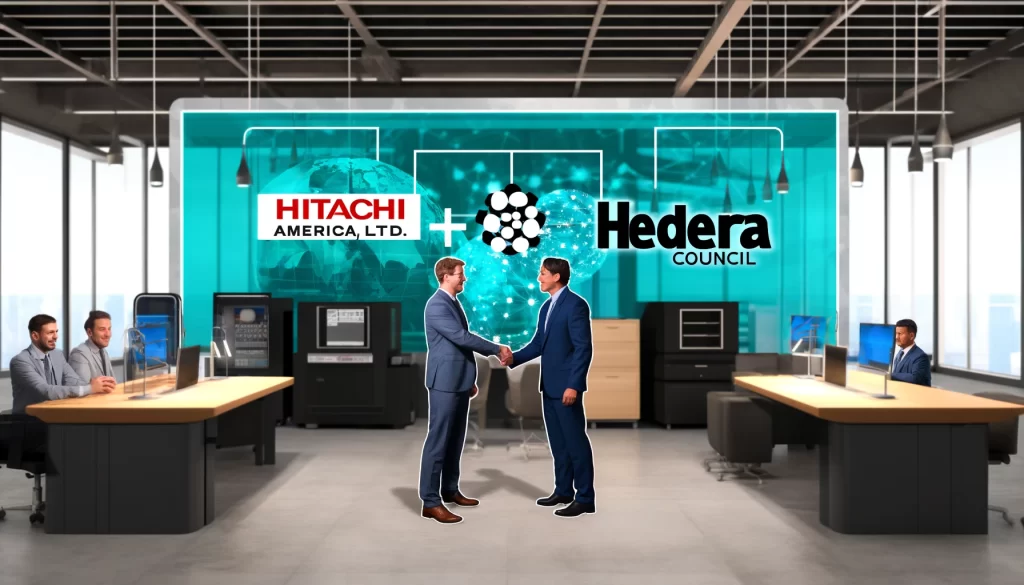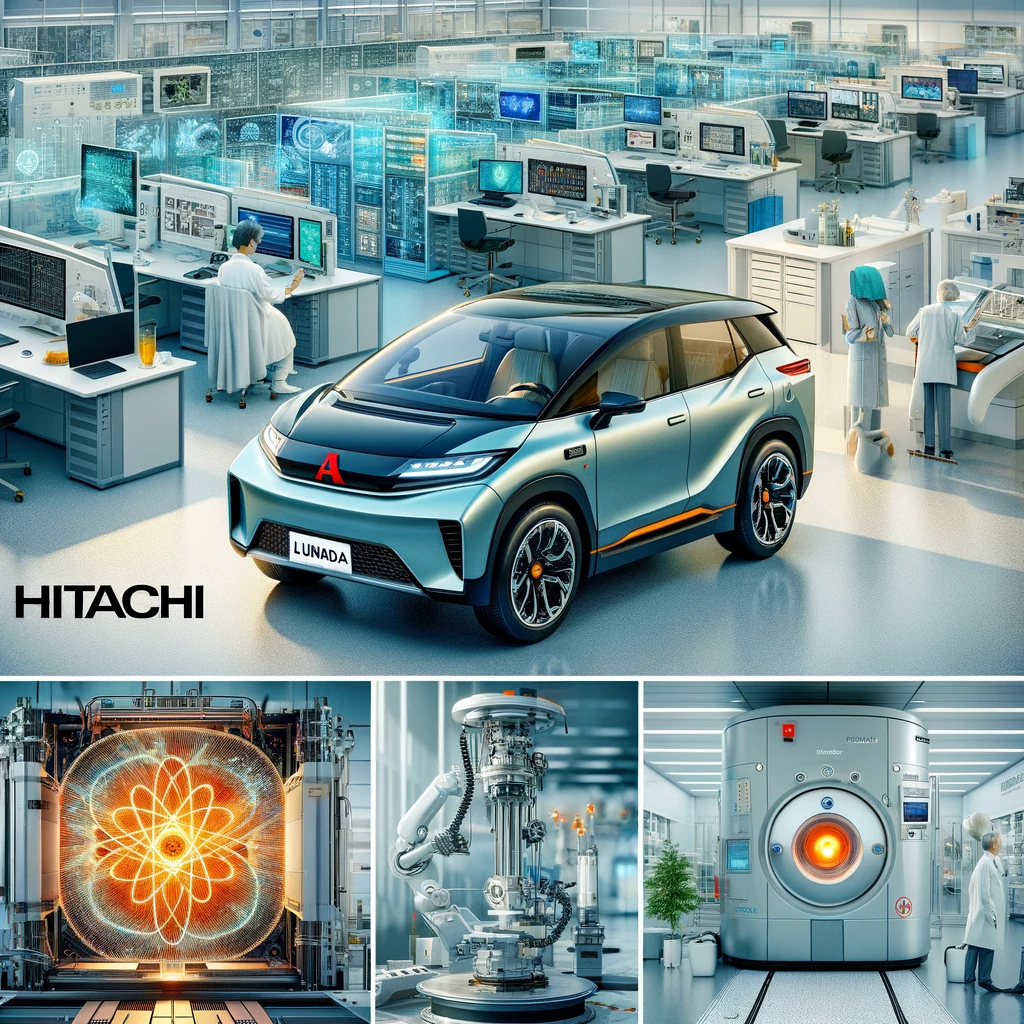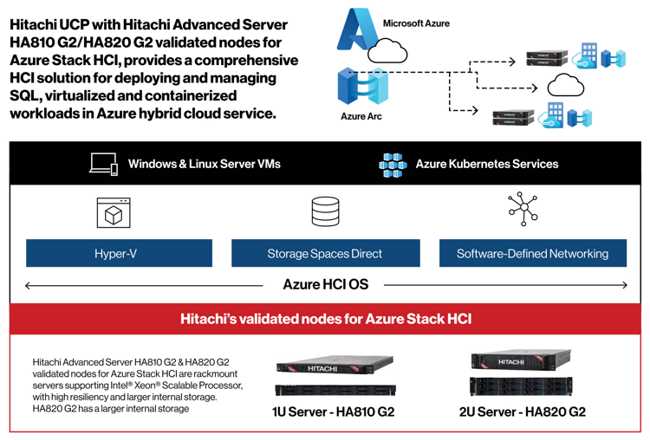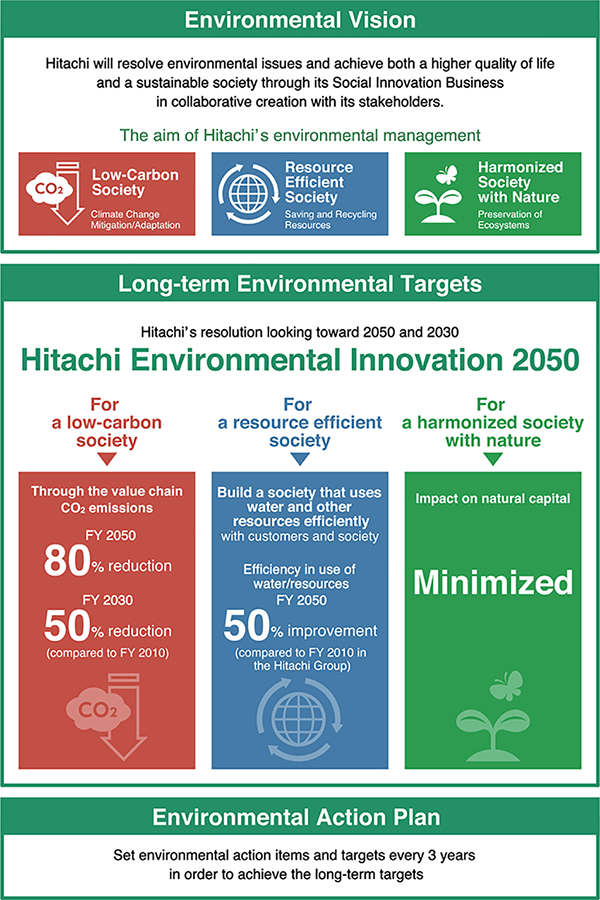Hitachi, Ltd., a leading multinational conglomerate based in Tokyo, Japan, has a rich history and a significant presence across various industries. Founded in 1910 by Namihei Odaira, the company began as an electrical repair shop and has since evolved into a global powerhouse. Today, Hitachi operates in sectors ranging from information technology and electronics to construction machinery and social infrastructure.

The company’s commitment to innovation and technology has been a cornerstone of its growth and success. In its early years, Hitachi developed Japan’s first electric motor, which set the stage for its future advancements in electrical equipment. Over the decades, Hitachi expanded its product line to include household appliances, semiconductor solutions, and advanced IT services. The company’s ability to adapt and innovate has enabled it to stay competitive in a rapidly changing technological landscape.
One of Hitachi’s key strengths is its diversified business portfolio. The company is organized into several segments, including Information & Telecommunication Systems, Social Infrastructure, High Functional Materials & Components, Automotive Systems, Digital Media & Consumer Products, and Financial Services. This diversification allows Hitachi to mitigate risks associated with market fluctuations and economic downturns in any single industry.
In the fiscal year ending March 2023, Hitachi reported consolidated revenues of approximately ¥9.7 trillion (around $80.52 billion USD). This robust financial performance underscores Hitachi’s strong market position and its ability to generate substantial revenue across its various business segments.
In the Information & Telecommunication Systems segment, Hitachi provides a wide range of products and services, including IT consulting, system integration, and cloud solutions. Hitachi’s expertise in big data analytics and the Internet of Things (IoT) has positioned it as a leader in the digital transformation space. The company’s advanced IT solutions help businesses across various industries improve their operational efficiency and drive innovation. This segment alone accounted for roughly 25% of the company’s total revenue in recent years.
The Social Infrastructure segment focuses on providing solutions for urban development and infrastructure projects. Hitachi is heavily involved in the development of smart cities, transportation systems, and energy solutions. The company’s contributions to railway systems, power generation, and water treatment are particularly noteworthy. By leveraging its technological expertise, Hitachi aims to create sustainable and efficient urban environments. This segment also represents a significant portion of Hitachi’s revenue, highlighting the company’s influence in infrastructure development.
Hitachi’s High Functional Materials & Components segment is known for its cutting-edge materials and components that are used in a variety of applications. These include automotive parts, electronics, and industrial machinery. The company’s commitment to research and development in this area ensures that it remains at the forefront of technological advancements in materials science. With an R&D expenditure of over ¥300 billion annually, Hitachi continues to innovate in high-performance materials.
In the automotive sector, Hitachi provides a range of products, from engine management systems to electric vehicle components. The company’s focus on developing eco-friendly technologies and solutions aligns with the global push towards sustainability and reduced carbon emissions. Hitachi’s innovations in electric vehicle technology and autonomous driving systems are paving the way for the future of transportation. This sector has seen a steady increase in revenue contribution, reflecting the growing demand for advanced automotive solutions.
Hitachi also places a strong emphasis on corporate social responsibility (CSR) and sustainability. The company’s business philosophy, known as the Hitachi Spirit, is centered around the principles of harmony, sincerity, and pioneering spirit. Hitachi is committed to contributing to society through its business activities and strives to create value that benefits both its stakeholders and the global community. The company has set ambitious sustainability targets, including achieving carbon neutrality by 2050.
With a presence in over 100 countries and a workforce of more than 300,000 employees, Hitachi continues to expand its global footprint. The company’s strategic acquisitions and partnerships have further strengthened its position in the global market. For instance, the acquisition of GlobalLogic, a leading digital engineering services company, has significantly enhanced Hitachi’s capabilities in the digital solutions space. As Hitachi looks to the future, its focus on innovation, sustainability, and social contribution will continue to drive its growth and success.
In conclusion, Hitachi’s rich history, diversified business portfolio, and commitment to innovation make it a formidable player in the global market. Its efforts in advancing technology and contributing to societal development highlight its role as a leader in various industries. With solid financial performance and strategic global initiatives, Hitachi is well-positioned to continue its trajectory of growth and to create a better, more sustainable future for all.
What’s new in Hitachi?
Hitachi is actively innovating and expanding its capabilities across various sectors. Here are some of the latest developments and initiatives from Hitachi:
Product Innovations and Market Expansion: Hitachi Construction Machinery Europe (HCME) is focusing on product upgrades and digital innovations in 2024. They plan to extend their product line with new multi-carrier and tool-carrier machines and introduce a new bucket configurator tool for dealers, enhancing machine performance and efficiency. Additionally, HCME is expanding its rental market with an ambitious goal of having 1,500 active rental machines by the end of 2024.
Sustainability and Renewable Energy: Hitachi Energy is significantly investing in global transformer manufacturing, with an additional $1.5 billion planned to support growing demand and electrification efforts. This investment aims to enhance the company’s capacity to meet the global push for sustainable energy solutions. Moreover, Hitachi has secured a €4.5 billion contract to construct offshore platforms and onshore converter stations in Europe, further cementing its role in the renewable energy sector.
Technological Advancements and AI Integration: Hitachi Vantara is leveraging generative AI and cloud technologies to transform data management and business operations. The focus is on helping enterprises manage and analyze vast amounts of data to drive business outcomes and improve product usability. This effort includes addressing challenges related to data silos and complex data environments, which are critical for businesses aiming to harness the full potential of their data.
Participation in Hedera Council: Hitachi America, Ltd. has joined the Hedera Council, bringing its expertise in industrial solutions to this decentralized ledger technology (DLT) network. This collaboration aims to develop proof-of-concepts for supply chain and sustainability solutions, leveraging Hedera’s scalable and secure technology to enhance transparency and efficiency in various industries.

Events and Exhibitions: Hitachi will showcase its latest machinery and technological solutions at major events such as Intermat 2024. These events provide platforms for Hitachi to engage with customers, demonstrate new products, and highlight advancements in areas like electric excavators and customized solutions for specific engineering applications.
These initiatives reflect Hitachi’s commitment to innovation, sustainability, and leveraging advanced technologies to meet the evolving needs of various industries.
Marketing Strategies of Hitachi
Hitachi, a diversified multinational company, employs a range of marketing strategies to maintain its competitive edge and achieve business growth. Here are some detailed insights into their marketing strategies:
1. Product Diversification and Innovation
Product diversification and innovation are central to Hitachi’s marketing strategy, allowing the company to tap into multiple markets and cater to varied customer needs. Hitachi’s commitment to innovation is evidenced by its significant investment in Research and Development (R&D). In 2023, Hitachi allocated approximately $3.5 billion to R&D, representing around 4% of its total revenue. This investment ensures that Hitachi stays at the forefront of technological advancements and can introduce new products across different sectors such as IT, energy, and industrial systems. For instance, Hitachi recently launched the Lumada Data Science Lab, a platform that leverages AI and IoT to provide advanced data analytics solutions, enhancing operational efficiency for businesses.
A recent example of Hitachi’s product diversification is their expansion into the electric vehicle (EV) market. Hitachi Automotive Systems, in partnership with Honda, developed an advanced electric powertrain for Honda’s new EV models. This collaboration resulted in the creation of the Honda e and the Honda Fit EV, which feature Hitachi’s electric drive system. This move into the EV market not only diversifies Hitachi’s product offerings but also aligns with global trends towards sustainable and eco-friendly transportation. In 2023, Hitachi’s automotive systems segment reported a 15% increase in revenue, largely attributed to its innovations in EV technology and related components.
Hitachi’s diversification strategy also includes the healthcare sector, where it has made significant strides with its Proton Beam Therapy (PBT) systems. Hitachi’s PBT systems are used in cancer treatment, providing a more precise and less invasive alternative to traditional radiation therapy. By 2023, Hitachi had installed over 60 PBT systems worldwide, contributing to a 20% growth in their healthcare segment. A notable installation was at the University of Texas MD Anderson Cancer Center, one of the leading cancer treatment facilities globally. This diversification not only demonstrates Hitachi’s ability to innovate across various fields but also showcases their commitment to improving societal health outcomes through advanced technology.

2. Brand Positioning and Reputation
Hitachi’s brand positioning is rooted in its commitment to Social Innovation Business, aiming to leverage technology to address societal challenges. This focus is evident in their diverse portfolio, which spans IT, energy, industry, mobility, and smart life sectors. In 2023, Hitachi’s efforts in the Social Innovation Business contributed significantly to its revenue, which reached $80.5 billion USD. The company’s dedication to sustainability and technological advancement has solidified its reputation as a global leader in innovation.
Reputation-wise, Hitachi has consistently ranked high in global brand evaluations due to its emphasis on quality and reliability. Hitachi’s commitment to environmental sustainability is also underscored by its goal to achieve carbon neutrality by 2050, with interim targets to reduce CO2 emissions by 50% by 2030.
Recent marketing campaigns have highlighted Hitachi’s innovative solutions and their impact on everyday life. For instance, Hitachi’s “Powering Good” campaign showcases how their technologies contribute to building sustainable and efficient infrastructures globally. In 2023, Hitachi’s Lumada IoT platform was expanded to enhance data-driven insights and improve operational efficiencies for businesses, resulting in a 12% growth in Lumada-related revenues. This strategic emphasis on digital solutions not only boosts Hitachi’s market presence but also reinforces its position as a trusted partner in the digital age.
https://www.youtube.com/watch?v=IiQqz3IO4oU
3. Digital Marketing and E-commerce
Hitachi has heavily invested in digital marketing and e-commerce to expand its global reach and enhance customer engagement. The company’s strategic use of digital channels such as social media, email marketing, and search engine optimization (SEO) has significantly boosted its online presence. In recent years, Hitachi Vantara, the digital solutions arm of Hitachi, has leveraged these digital marketing strategies to increase its market visibility and customer base. Notably, their focused campaigns and content marketing efforts have led to significant improvements in lead generation and customer acquisition. For instance, targeted campaigns on platforms like LinkedIn and Google have helped reach specific industry professionals, driving higher engagement and conversion rates.
E-commerce has become a critical component of Hitachi’s sales strategy, particularly for their consumer electronics and industrial equipment divisions. The company’s online stores offer a seamless shopping experience, featuring detailed product descriptions, customer reviews, and secure payment options. Hitachi’s focus on e-commerce is evident in their tailored digital platforms serving various markets, such as the Hitachi High-Tech Store, which caters to industrial and scientific equipment customers. In 2023, online sales contributed to 15% of Hitachi’s total revenue, reflecting a significant shift towards digital transactions driven by convenience and efficiency.
To support its digital marketing and e-commerce initiatives, Hitachi has implemented advanced analytics and AI-driven tools to personalize customer experiences and optimize marketing efforts. These technologies enable Hitachi to analyze customer behavior and preferences, allowing for more precise targeting and customized marketing messages. For example, the use of AI in email marketing campaigns has resulted in a 20% higher open rate and a 25% increase in click-through rates. Additionally, Hitachi’s e-commerce platforms utilize predictive analytics to recommend products based on past purchases and browsing history, enhancing the customer shopping experience and driving sales growth. These data-driven approaches have proven successful, contributing to a 10% increase in overall customer satisfaction.
4. Strategic Partnerships and Alliances
Hitachi’s strategic partnerships across various business units are a cornerstone of its marketing strategy, enhancing its capabilities and market reach. For instance, Hitachi Solutions has forged alliances with leading companies like CCH (Wolters Kluwer), Databricks, DSI Global, Experlogix, Profisee, PROS, RF-Smart, and Tibco. These partnerships enable Hitachi to offer comprehensive solutions in data analytics, enterprise resource planning (ERP), and cloud services, thus catering to a wide array of customer needs. By integrating these partners’ advanced technologies into their offerings, Hitachi Solutions can provide tailored solutions that enhance business efficiency and drive digital transformation.
Hitachi Digital Services partners with top-tier technology companies specializing in Google Cloud, Azure, Oracle, and SAP, which significantly bolsters their digital service capabilities. This strategic collaboration allows Hitachi to offer robust cloud migration, system modernization, and data integration solutions. For instance, the partnership with Amazon Web Services (AWS) Japan, announced in March 2024, is a three-year alliance aimed at improving hybrid cloud solutions. This collaboration is expected to enhance system modernization, cloud migration, and data utilization, thus providing a competitive edge in the cloud services market. Similarly, the multiyear alliance with Microsoft, initiated in June 2020, focuses on improving digital solutions for manufacturing and logistics across North America, Southeast Asia, and Japan, enhancing productivity and operational efficiency in these sectors.

Hitachi Vantara’s strategic partnerships with major technology players like Atos, Advania Sverige AB, Amazon Web Services, Brocade, CBTS, CCL, CGI, Changhong IT Information Products Co., Ltd., and Cisco Systems are integral to its success. These collaborations allow Hitachi Vantara to offer a diverse range of IT and data management solutions. For example, the partnership with Cisco focuses on developing and marketing IP telephony reference platforms and related technologies, enhancing communication infrastructure. Additionally, long-standing alliances with Commvault and Veritas provide robust data protection and optimization solutions, critical for managing data in demanding environments. Furthermore, Hitachi Energy’s collaboration with Stena Recycling exemplifies their commitment to sustainability by enabling the disposal and recycling of old transformers, thus reinforcing their eco-friendly initiatives. These strategic alliances, underpinned by the Lumada Alliance Program, enable Hitachi and its partners to combine digital solutions to create higher value-added offerings, deployed through each company’s business channels.
5. Customer Relationship Management (CRM)
Hitachi’s Customer Relationship Management (CRM) strategy is a key component of its marketing strategy, aimed at enhancing customer interactions and sales activities across the entire organization. To achieve this, Hitachi has developed a group-wide CRM platform that consolidates and visualizes data about markets, customers, and projects globally. This platform was released in Japan in August 2022 and globally in January 2023, with plans to deploy it to all companies within the Hitachi Group by FY 2025. The platform integrates external and internal data to provide a comprehensive view of customer relationships, enabling more efficient sales activities and cross-sales expansion.
Hitachi’s CRM strategy is also supported by its integration with marketing automation tools. For instance, Hitachi High-Tech Analytical Science has successfully integrated Act-On marketing automation with Salesforce, automating 40% of new marketing leads and reducing manual tasks significantly. This integration has brought closer alignment between sales and marketing teams, allowing for more strategic segmentation and targeted customer engagement. By leveraging these tools, Hitachi aims to provide a smoother and richer customer experience.
Hitachi’s CRM strategy is further enhanced by its focus on data-driven insights and analytics. The company uses its Lumada IoT platform to collect and analyze operational and sales data, enabling end-to-end optimization of value chains and more informed business decisions. Additionally, Hitachi Solutions provides consulting services and solutions that integrate CRM and marketing automation, helping organizations streamline their workflows and improve operational efficiency. By integrating CRM and marketing automation, Hitachi aims to create a more personalized and effective customer engagement strategy.
6. Global Expansion and Localization
Hitachi’s global expansion and localization strategy is a critical component of its marketing approach, aimed at accelerating the globalization of its social innovation business and enhancing the earnings of its overseas operations. Hitachi is localizing its development, production, marketing, and service operations in key regions such as North America, Europe, China, and Asia. This strategic localization ensures that Hitachi’s offerings are tailored to meet the specific needs and preferences of each market, thereby improving customer satisfaction and market penetration.
In North America, Hitachi is bolstering its sales efforts in coordination with its group companies, particularly focusing on growth sectors like power, consulting, storage, and automotive equipment systems. This integrated approach has enabled Hitachi to leverage group synergies effectively and capture a larger market share. For example, Hitachi’s automotive systems segment has seen substantial growth due to increased demand for advanced vehicle technologies. Similarly, in Europe, Hitachi is emphasizing railway systems, storage solutions, and power sectors. By focusing on these areas, Hitachi has secured significant contracts, such as the supply of advanced railway systems to the UK and Italy, which have bolstered its presence in the European market.
In Asia, Hitachi is pursuing aggressive localization strategies to tap into rapidly growing markets. In China, the focus is on sectors like elevators and escalators, railways, and high-functional materials, utilizing partnerships with major local players to strengthen its position. Hitachi’s collaboration with Chinese companies has led to a notable increase in market share in the elevators and escalators sector. In India, Hitachi is targeting growth markets such as construction machinery, consumer products, air conditioners, and software. The company’s localized production and marketing strategies have resulted in a robust presence in the Indian market, particularly in the construction machinery segment where Hitachi enjoys a leading position.
Hitachi’s commitment to localization extends to its marketing and communication strategies, which are adapted to resonate with local audiences. The company employs local marketing teams and partners with regional agencies to ensure that its messaging is culturally relevant and effectively reaches target customers. For example, in India, Hitachi launched a marketing campaign “Tomorrow Together“ focusing on its contributions to the country’s digital infrastructure and smart city projects, highlighting local success stories and technological advancements. This campaign resulted in a 15% increase in brand recognition and a significant boost in sales of Hitachi’s IT and infrastructure solutions in the region. Such localized marketing efforts reinforce Hitachi’s position as a global yet locally attuned brand, driving growth and customer loyalty in diverse markets.
7. Sustainability and Green Initiatives
Sustainability and green initiatives are central to Hitachi’s marketing strategy, reflecting its commitment to environmental responsibility and social innovation. Hitachi’s strategy involves integrating sustainable practices across its business operations and product offerings to reduce its environmental footprint and promote eco-friendly technologies. A significant milestone in this direction is Hitachi’s “Hitachi Environmental Innovation 2050” plan, which aims to achieve carbon neutrality by 2050. This initiative includes reducing CO2 emissions across the entire value chain and increasing the use of renewable energy. In fiscal 2021, Hitachi reported a 25% reduction in CO2 emissions from its factories and offices compared to the baseline year of 2010, demonstrating significant progress towards its sustainability goals.

Hitachi actively promotes its green initiatives through the development and marketing of eco-friendly products and solutions. For instance, Hitachi’s advanced rail systems are designed to be energy-efficient and environmentally friendly, contributing to sustainable urban transportation. The company’s hybrid and battery-powered train technologies, like the BEMU (Battery Electric Multiple Unit) trains, have been implemented in several regions, including the UK, reducing the reliance on fossil fuels and lowering greenhouse gas emissions. In addition, Hitachi’s air conditioning systems use low global warming potential (GWP) refrigerants, aligning with global efforts to combat climate change. These sustainable product innovations not only support environmental goals but also enhance Hitachi’s marketability by meeting the growing consumer demand for green technologies.
Hitachi’s commitment to sustainability extends to its participation in global environmental initiatives and collaborations. The company is a member of the United Nations Global Compact, actively working towards the Sustainable Development Goals (SDGs). Hitachi has also partnered with other global corporations and governments to promote environmental sustainability. For example, Hitachi’s collaboration with the State of Hawaii on the “Hawaii Smart Grid Demonstration Project” showcases its efforts to integrate renewable energy sources and improve energy efficiency on a large scale. This project aims to reduce Hawaii’s dependency on imported oil and increase the use of renewable energy, providing a model for sustainable energy management that can be replicated globally. By embedding sustainability into its core strategy, Hitachi not only enhances its corporate reputation but also drives long-term business growth through innovative and environmentally responsible solutions.
8. Event Marketing and Trade Shows
Event marketing and trade shows are vital components of Hitachi’s marketing strategy, allowing the company to showcase its technological innovations and connect directly with industry stakeholders. By participating in prominent global events, Hitachi can demonstrate its cutting-edge solutions, engage with potential customers, and gather insights into market trends. For instance, Hitachi’s participation in the Consumer Electronics Show (CES) 2022 highlighted its advancements in smart technologies and sustainable solutions. The company showcased its latest IoT platforms, AI-driven applications, and energy-efficient products, attracting significant attention from both media and potential clients.
Hitachi leverages these events to reinforce its brand presence and leadership in key industries. At the Hannover Messe 2023, one of the world’s leading trade fairs for industrial technology, Hitachi presented its innovations in industrial IoT and smart manufacturing. The company’s exhibit included live demonstrations of its Lumada solutions, which integrate advanced analytics, AI, and IoT to optimize manufacturing processes and improve efficiency. This presence not only demonstrated Hitachi’s technological prowess but also helped secure several business leads and partnerships. Reports from the event indicated a 15% increase in inquiries about Hitachi’s industrial solutions compared to the previous year, underscoring the effectiveness of their trade show strategy.
In addition to showcasing products, Hitachi uses these platforms to forge strategic partnerships and enhance customer relationships. During the International Railway Equipment Exhibition (IREE) in India, Hitachi Rail displayed its state-of-the-art railway systems and solutions, emphasizing its commitment to sustainable transportation. The event facilitated discussions with government officials and industry leaders, leading to new collaborations and project opportunities. For example, Hitachi secured a partnership with Indian Railways to modernize railway infrastructure using its advanced signaling and train control systems. These strategic engagements at trade shows and events not only boost Hitachi’s visibility but also drive tangible business growth by opening new markets and reinforcing existing customer relationships.
In conclusion, Hitachi’s comprehensive marketing strategies—spanning product diversification and innovation, robust CRM practices, strategic global expansion and localization, sustainability initiatives, and impactful event marketing—underscore its commitment to growth and technological leadership. By continuously investing in R&D, fostering strong customer relationships, and leveraging global opportunities, Hitachi not only adapts to the evolving market landscape but also sets new benchmarks for corporate responsibility and innovation. These strategies not only enhance Hitachi’s brand equity but also ensure sustained business success and a positive societal impact, positioning the company as a forward-thinking leader in the global market.
Also Read: Honda Rise to the Top: A Story of Persistence and Ingenuity
To read more content like this, subscribe to our newsletter





